Racism's Influence on Health: A Study of Cultural Safety in Healthcare
VerifiedAdded on 2023/04/11
|7
|1059
|78
Essay
AI Summary
This essay examines the profound impact of racism on healthcare, focusing on institutional racism and its effects on health inequalities. The analysis begins by defining racism and its different forms, including personal and institutional racism, highlighting how these manifest in healthcare settings. The essay explores the concept of "whiteness" in healthcare and its potential effects on patient care and professional dynamics. It emphasizes the importance of cultural safety in healthcare facilities, advocating for culturally competent practices to address disparities. The essay concludes with a discussion on the need for cultural proficiency education for healthcare providers and nursing students to deliver quality healthcare services and improve outcomes. The author reflects on the lecture, discussing the widespread nature of racism, and its impact on different communities.
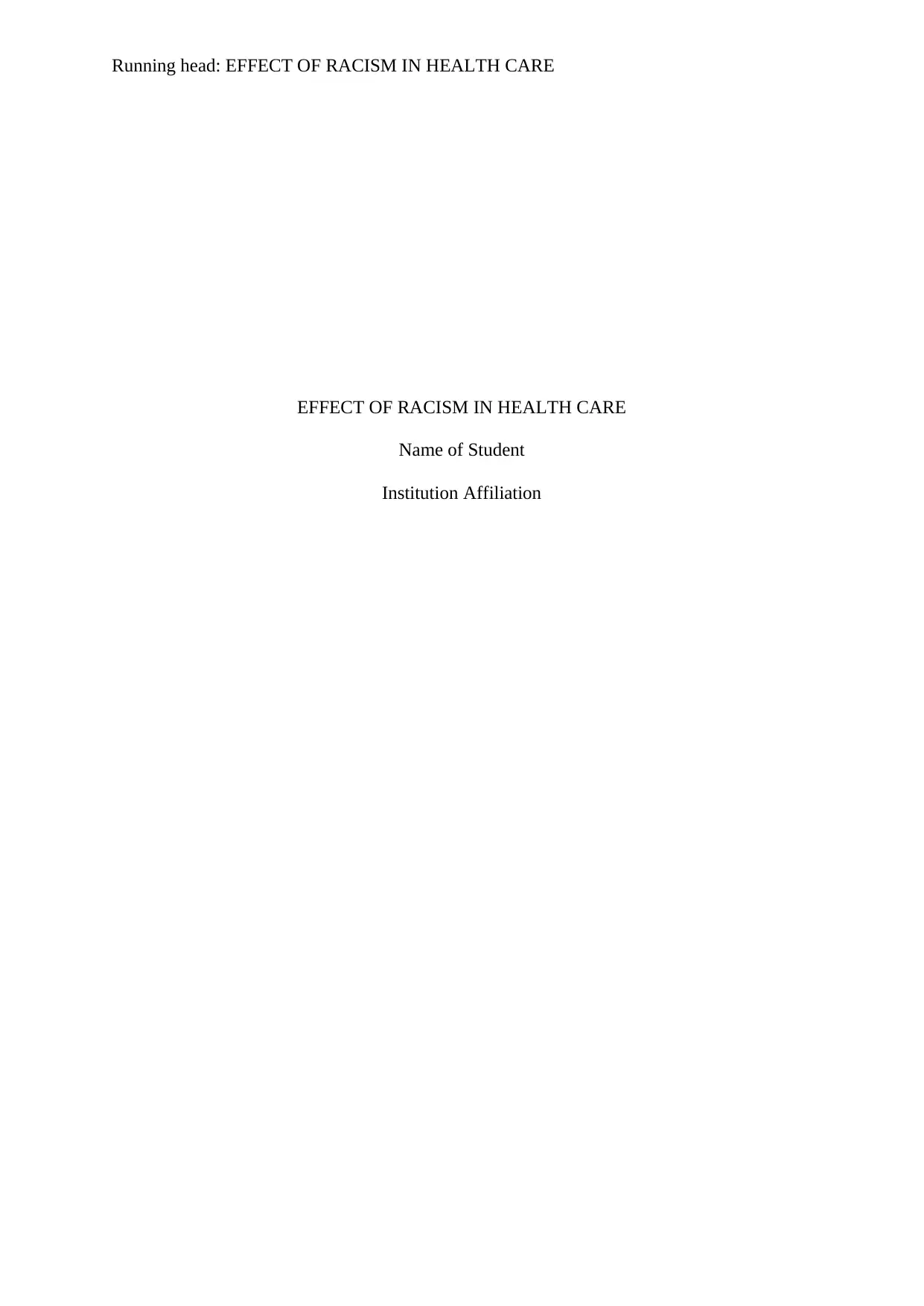
Running head: EFFECT OF RACISM IN HEALTH CARE
EFFECT OF RACISM IN HEALTH CARE
Name of Student
Institution Affiliation
EFFECT OF RACISM IN HEALTH CARE
Name of Student
Institution Affiliation
Paraphrase This Document
Need a fresh take? Get an instant paraphrase of this document with our AI Paraphraser
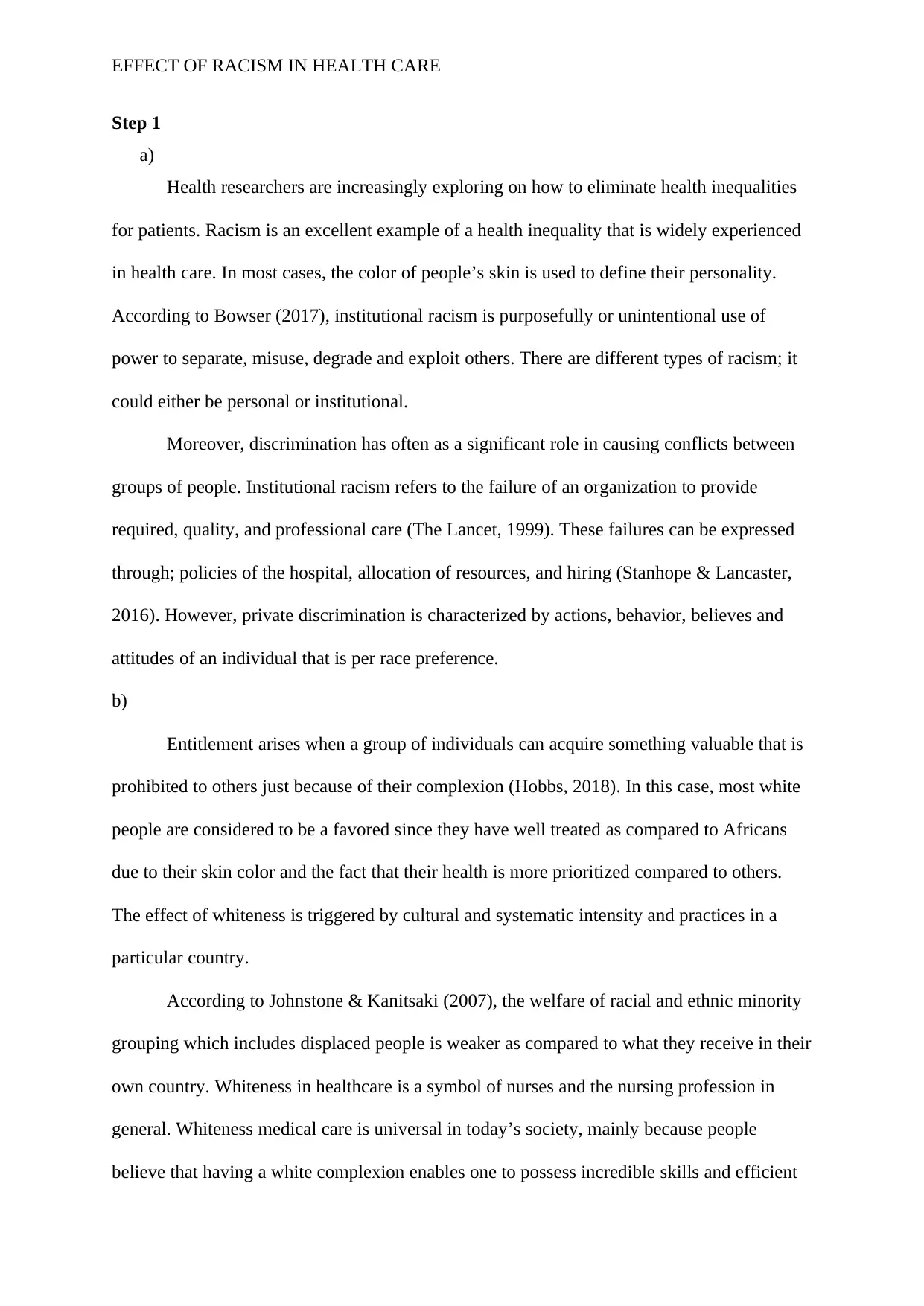
EFFECT OF RACISM IN HEALTH CARE
Step 1
a)
Health researchers are increasingly exploring on how to eliminate health inequalities
for patients. Racism is an excellent example of a health inequality that is widely experienced
in health care. In most cases, the color of people’s skin is used to define their personality.
According to Bowser (2017), institutional racism is purposefully or unintentional use of
power to separate, misuse, degrade and exploit others. There are different types of racism; it
could either be personal or institutional.
Moreover, discrimination has often as a significant role in causing conflicts between
groups of people. Institutional racism refers to the failure of an organization to provide
required, quality, and professional care (The Lancet, 1999). These failures can be expressed
through; policies of the hospital, allocation of resources, and hiring (Stanhope & Lancaster,
2016). However, private discrimination is characterized by actions, behavior, believes and
attitudes of an individual that is per race preference.
b)
Entitlement arises when a group of individuals can acquire something valuable that is
prohibited to others just because of their complexion (Hobbs, 2018). In this case, most white
people are considered to be a favored since they have well treated as compared to Africans
due to their skin color and the fact that their health is more prioritized compared to others.
The effect of whiteness is triggered by cultural and systematic intensity and practices in a
particular country.
According to Johnstone & Kanitsaki (2007), the welfare of racial and ethnic minority
grouping which includes displaced people is weaker as compared to what they receive in their
own country. Whiteness in healthcare is a symbol of nurses and the nursing profession in
general. Whiteness medical care is universal in today’s society, mainly because people
believe that having a white complexion enables one to possess incredible skills and efficient
Step 1
a)
Health researchers are increasingly exploring on how to eliminate health inequalities
for patients. Racism is an excellent example of a health inequality that is widely experienced
in health care. In most cases, the color of people’s skin is used to define their personality.
According to Bowser (2017), institutional racism is purposefully or unintentional use of
power to separate, misuse, degrade and exploit others. There are different types of racism; it
could either be personal or institutional.
Moreover, discrimination has often as a significant role in causing conflicts between
groups of people. Institutional racism refers to the failure of an organization to provide
required, quality, and professional care (The Lancet, 1999). These failures can be expressed
through; policies of the hospital, allocation of resources, and hiring (Stanhope & Lancaster,
2016). However, private discrimination is characterized by actions, behavior, believes and
attitudes of an individual that is per race preference.
b)
Entitlement arises when a group of individuals can acquire something valuable that is
prohibited to others just because of their complexion (Hobbs, 2018). In this case, most white
people are considered to be a favored since they have well treated as compared to Africans
due to their skin color and the fact that their health is more prioritized compared to others.
The effect of whiteness is triggered by cultural and systematic intensity and practices in a
particular country.
According to Johnstone & Kanitsaki (2007), the welfare of racial and ethnic minority
grouping which includes displaced people is weaker as compared to what they receive in their
own country. Whiteness in healthcare is a symbol of nurses and the nursing profession in
general. Whiteness medical care is universal in today’s society, mainly because people
believe that having a white complexion enables one to possess incredible skills and efficient
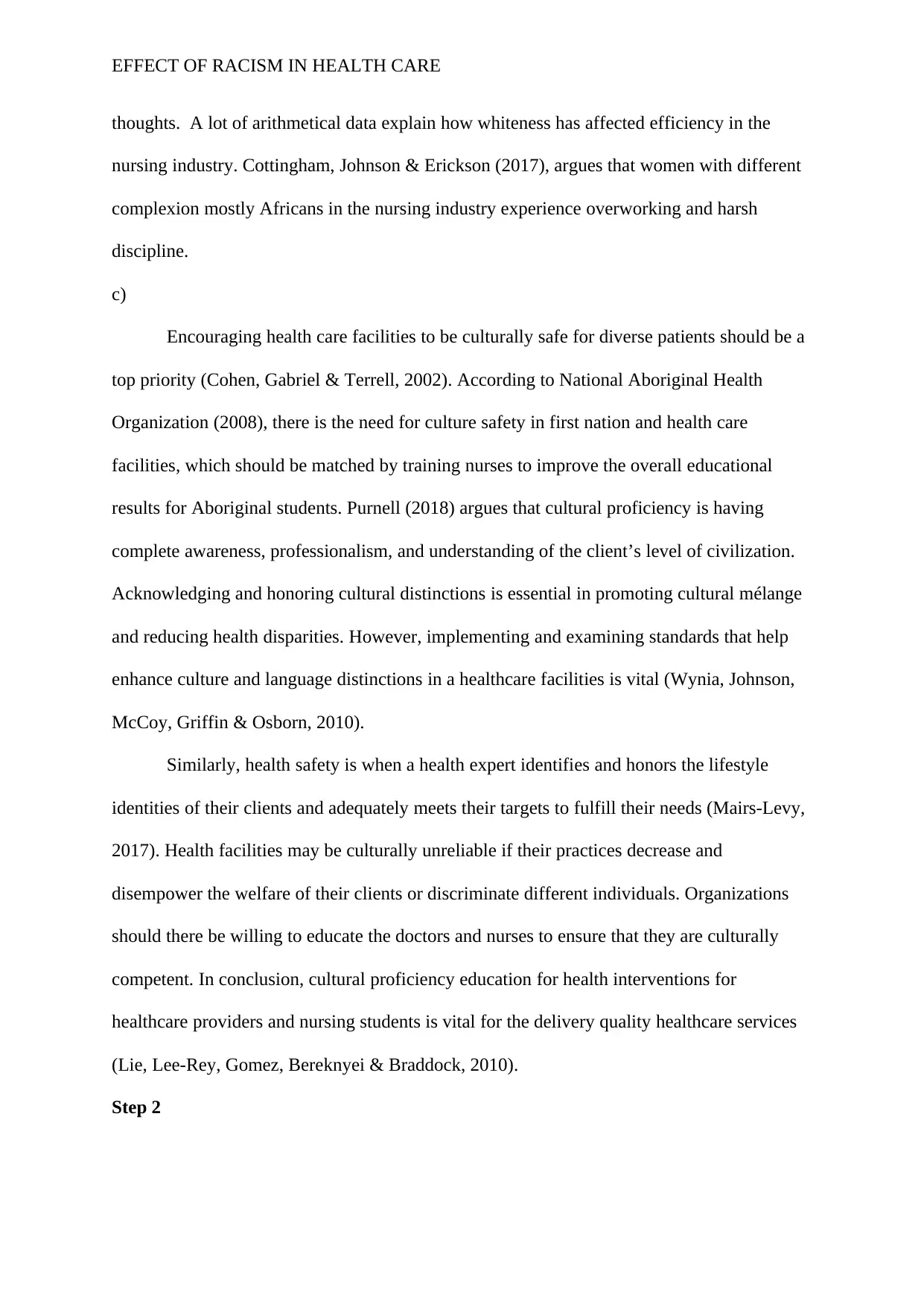
EFFECT OF RACISM IN HEALTH CARE
thoughts. A lot of arithmetical data explain how whiteness has affected efficiency in the
nursing industry. Cottingham, Johnson & Erickson (2017), argues that women with different
complexion mostly Africans in the nursing industry experience overworking and harsh
discipline.
c)
Encouraging health care facilities to be culturally safe for diverse patients should be a
top priority (Cohen, Gabriel & Terrell, 2002). According to National Aboriginal Health
Organization (2008), there is the need for culture safety in first nation and health care
facilities, which should be matched by training nurses to improve the overall educational
results for Aboriginal students. Purnell (2018) argues that cultural proficiency is having
complete awareness, professionalism, and understanding of the client’s level of civilization.
Acknowledging and honoring cultural distinctions is essential in promoting cultural mélange
and reducing health disparities. However, implementing and examining standards that help
enhance culture and language distinctions in a healthcare facilities is vital (Wynia, Johnson,
McCoy, Griffin & Osborn, 2010).
Similarly, health safety is when a health expert identifies and honors the lifestyle
identities of their clients and adequately meets their targets to fulfill their needs (Mairs-Levy,
2017). Health facilities may be culturally unreliable if their practices decrease and
disempower the welfare of their clients or discriminate different individuals. Organizations
should there be willing to educate the doctors and nurses to ensure that they are culturally
competent. In conclusion, cultural proficiency education for health interventions for
healthcare providers and nursing students is vital for the delivery quality healthcare services
(Lie, Lee-Rey, Gomez, Bereknyei & Braddock, 2010).
Step 2
thoughts. A lot of arithmetical data explain how whiteness has affected efficiency in the
nursing industry. Cottingham, Johnson & Erickson (2017), argues that women with different
complexion mostly Africans in the nursing industry experience overworking and harsh
discipline.
c)
Encouraging health care facilities to be culturally safe for diverse patients should be a
top priority (Cohen, Gabriel & Terrell, 2002). According to National Aboriginal Health
Organization (2008), there is the need for culture safety in first nation and health care
facilities, which should be matched by training nurses to improve the overall educational
results for Aboriginal students. Purnell (2018) argues that cultural proficiency is having
complete awareness, professionalism, and understanding of the client’s level of civilization.
Acknowledging and honoring cultural distinctions is essential in promoting cultural mélange
and reducing health disparities. However, implementing and examining standards that help
enhance culture and language distinctions in a healthcare facilities is vital (Wynia, Johnson,
McCoy, Griffin & Osborn, 2010).
Similarly, health safety is when a health expert identifies and honors the lifestyle
identities of their clients and adequately meets their targets to fulfill their needs (Mairs-Levy,
2017). Health facilities may be culturally unreliable if their practices decrease and
disempower the welfare of their clients or discriminate different individuals. Organizations
should there be willing to educate the doctors and nurses to ensure that they are culturally
competent. In conclusion, cultural proficiency education for health interventions for
healthcare providers and nursing students is vital for the delivery quality healthcare services
(Lie, Lee-Rey, Gomez, Bereknyei & Braddock, 2010).
Step 2
⊘ This is a preview!⊘
Do you want full access?
Subscribe today to unlock all pages.

Trusted by 1+ million students worldwide
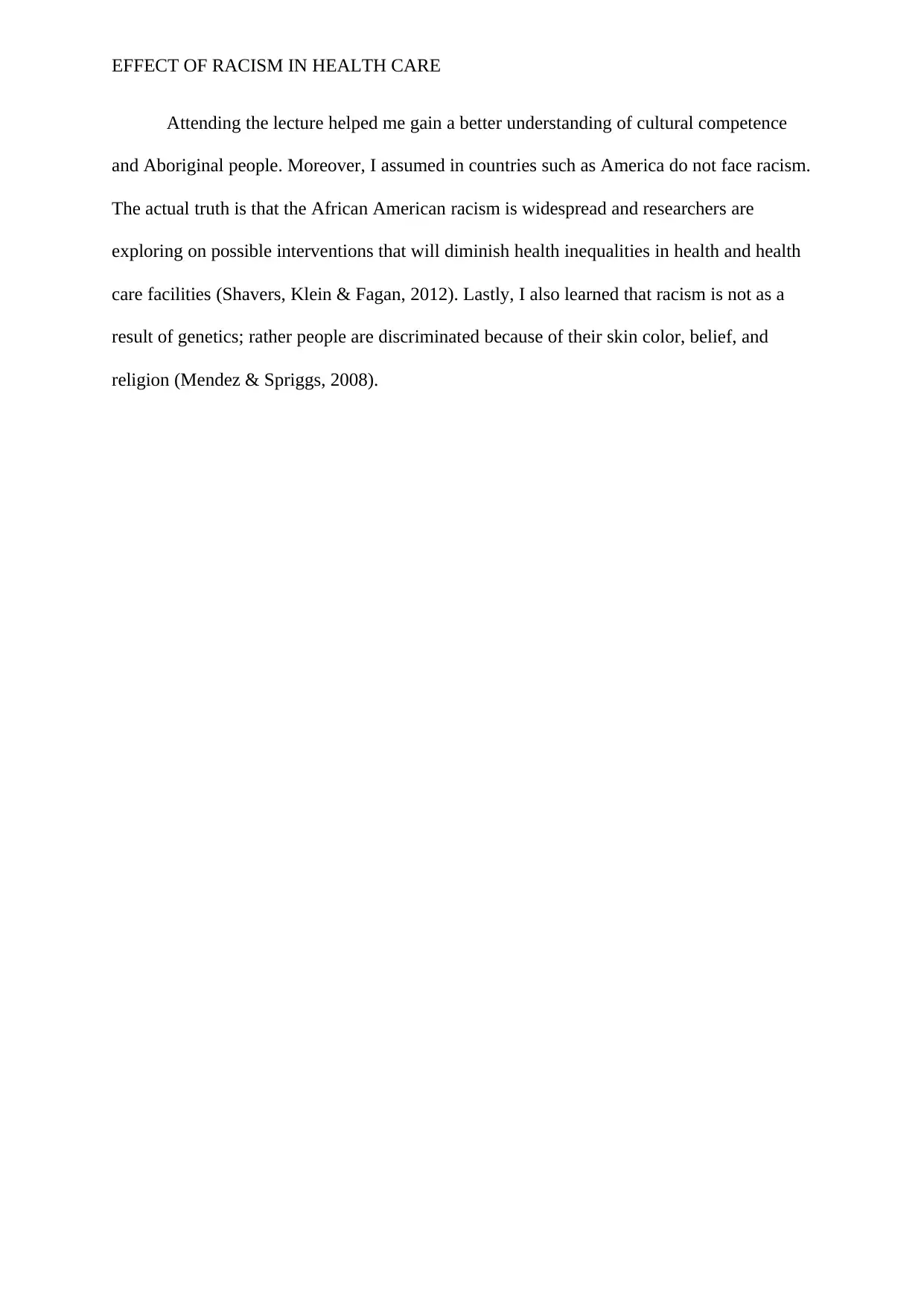
EFFECT OF RACISM IN HEALTH CARE
Attending the lecture helped me gain a better understanding of cultural competence
and Aboriginal people. Moreover, I assumed in countries such as America do not face racism.
The actual truth is that the African American racism is widespread and researchers are
exploring on possible interventions that will diminish health inequalities in health and health
care facilities (Shavers, Klein & Fagan, 2012). Lastly, I also learned that racism is not as a
result of genetics; rather people are discriminated because of their skin color, belief, and
religion (Mendez & Spriggs, 2008).
Attending the lecture helped me gain a better understanding of cultural competence
and Aboriginal people. Moreover, I assumed in countries such as America do not face racism.
The actual truth is that the African American racism is widespread and researchers are
exploring on possible interventions that will diminish health inequalities in health and health
care facilities (Shavers, Klein & Fagan, 2012). Lastly, I also learned that racism is not as a
result of genetics; rather people are discriminated because of their skin color, belief, and
religion (Mendez & Spriggs, 2008).
Paraphrase This Document
Need a fresh take? Get an instant paraphrase of this document with our AI Paraphraser
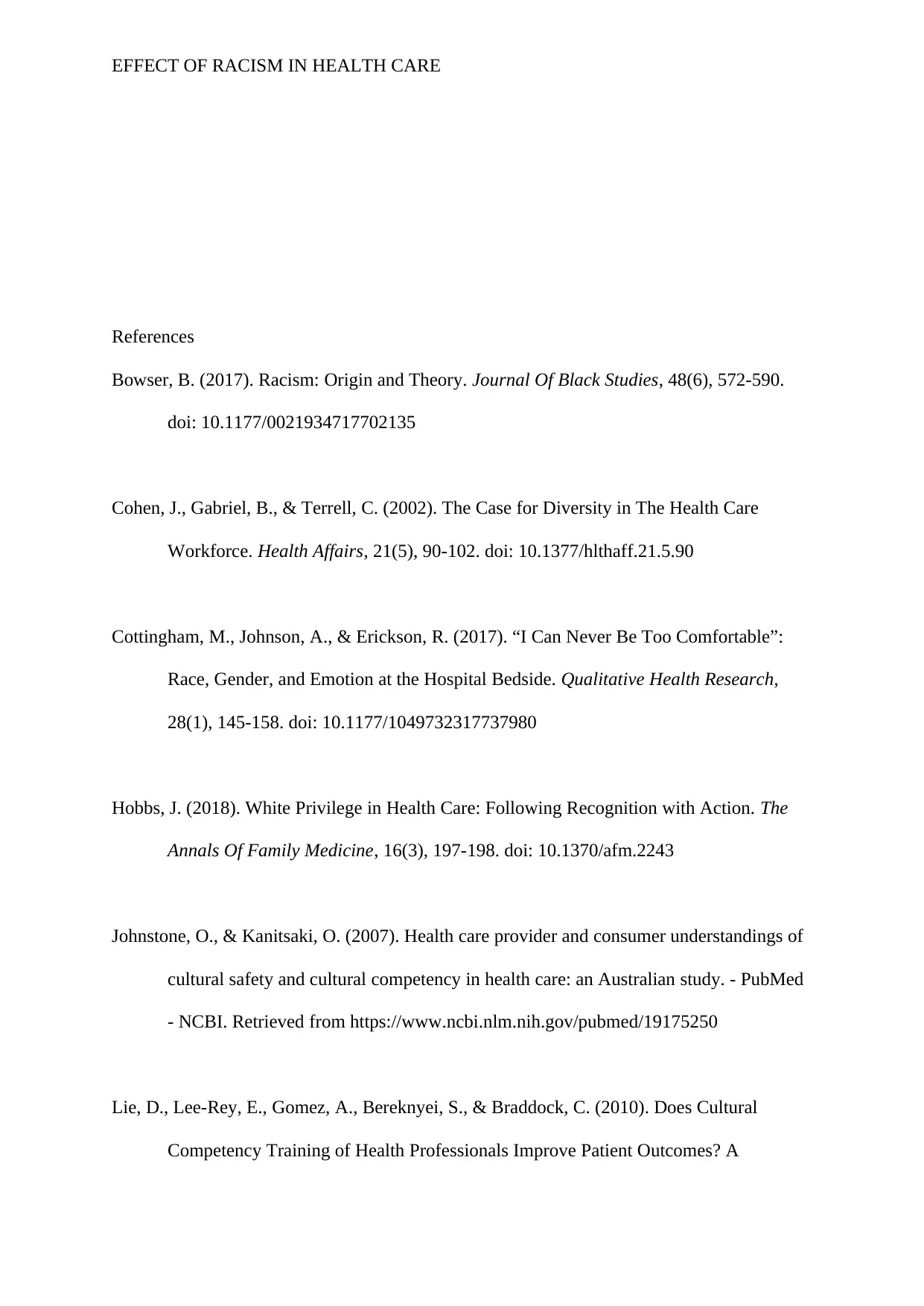
EFFECT OF RACISM IN HEALTH CARE
References
Bowser, B. (2017). Racism: Origin and Theory. Journal Of Black Studies, 48(6), 572-590.
doi: 10.1177/0021934717702135
Cohen, J., Gabriel, B., & Terrell, C. (2002). The Case for Diversity in The Health Care
Workforce. Health Affairs, 21(5), 90-102. doi: 10.1377/hlthaff.21.5.90
Cottingham, M., Johnson, A., & Erickson, R. (2017). “I Can Never Be Too Comfortable”:
Race, Gender, and Emotion at the Hospital Bedside. Qualitative Health Research,
28(1), 145-158. doi: 10.1177/1049732317737980
Hobbs, J. (2018). White Privilege in Health Care: Following Recognition with Action. The
Annals Of Family Medicine, 16(3), 197-198. doi: 10.1370/afm.2243
Johnstone, O., & Kanitsaki, O. (2007). Health care provider and consumer understandings of
cultural safety and cultural competency in health care: an Australian study. - PubMed
- NCBI. Retrieved from https://www.ncbi.nlm.nih.gov/pubmed/19175250
Lie, D., Lee-Rey, E., Gomez, A., Bereknyei, S., & Braddock, C. (2010). Does Cultural
Competency Training of Health Professionals Improve Patient Outcomes? A
References
Bowser, B. (2017). Racism: Origin and Theory. Journal Of Black Studies, 48(6), 572-590.
doi: 10.1177/0021934717702135
Cohen, J., Gabriel, B., & Terrell, C. (2002). The Case for Diversity in The Health Care
Workforce. Health Affairs, 21(5), 90-102. doi: 10.1377/hlthaff.21.5.90
Cottingham, M., Johnson, A., & Erickson, R. (2017). “I Can Never Be Too Comfortable”:
Race, Gender, and Emotion at the Hospital Bedside. Qualitative Health Research,
28(1), 145-158. doi: 10.1177/1049732317737980
Hobbs, J. (2018). White Privilege in Health Care: Following Recognition with Action. The
Annals Of Family Medicine, 16(3), 197-198. doi: 10.1370/afm.2243
Johnstone, O., & Kanitsaki, O. (2007). Health care provider and consumer understandings of
cultural safety and cultural competency in health care: an Australian study. - PubMed
- NCBI. Retrieved from https://www.ncbi.nlm.nih.gov/pubmed/19175250
Lie, D., Lee-Rey, E., Gomez, A., Bereknyei, S., & Braddock, C. (2010). Does Cultural
Competency Training of Health Professionals Improve Patient Outcomes? A
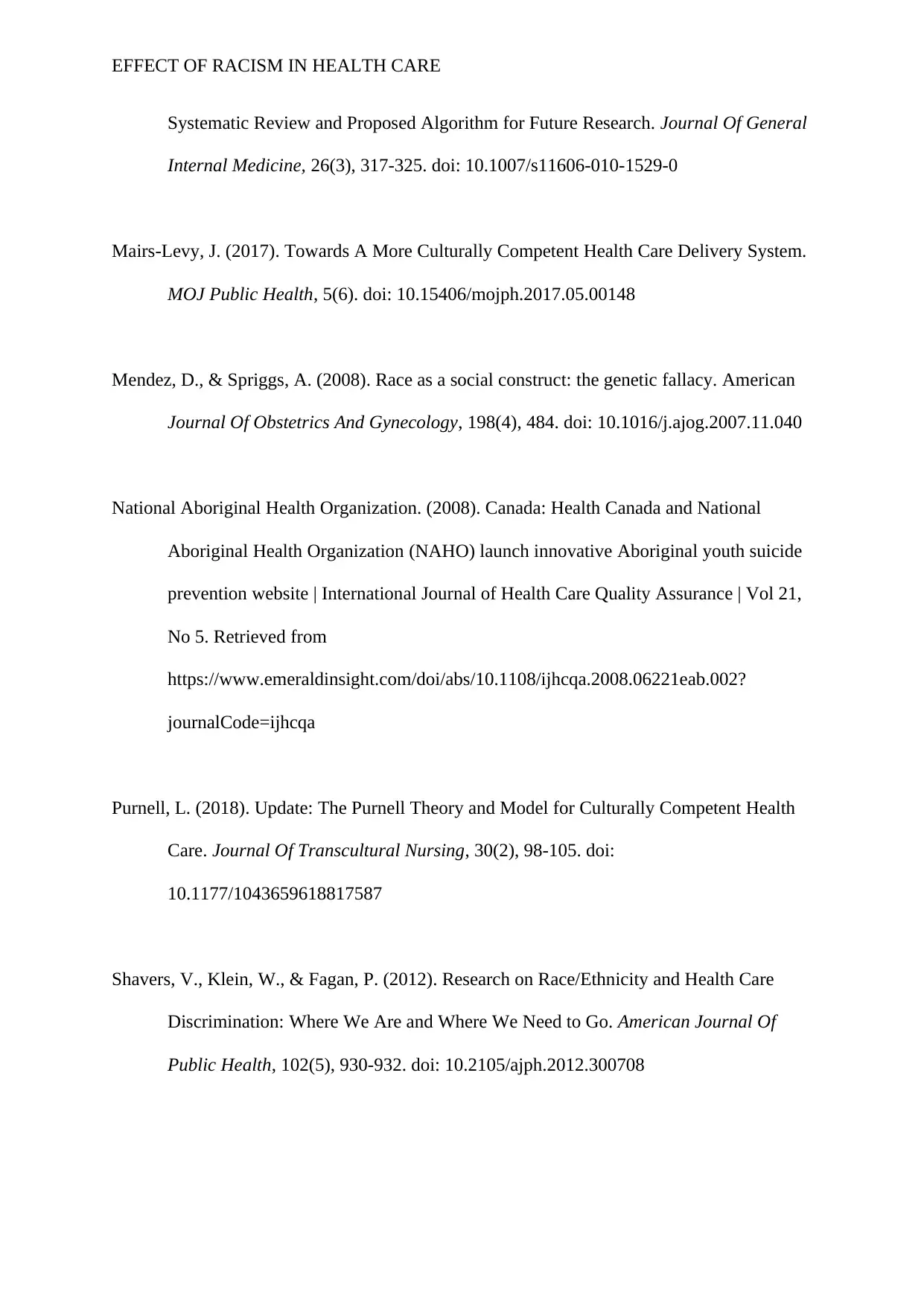
EFFECT OF RACISM IN HEALTH CARE
Systematic Review and Proposed Algorithm for Future Research. Journal Of General
Internal Medicine, 26(3), 317-325. doi: 10.1007/s11606-010-1529-0
Mairs-Levy, J. (2017). Towards A More Culturally Competent Health Care Delivery System.
MOJ Public Health, 5(6). doi: 10.15406/mojph.2017.05.00148
Mendez, D., & Spriggs, A. (2008). Race as a social construct: the genetic fallacy. American
Journal Of Obstetrics And Gynecology, 198(4), 484. doi: 10.1016/j.ajog.2007.11.040
National Aboriginal Health Organization. (2008). Canada: Health Canada and National
Aboriginal Health Organization (NAHO) launch innovative Aboriginal youth suicide
prevention website | International Journal of Health Care Quality Assurance | Vol 21,
No 5. Retrieved from
https://www.emeraldinsight.com/doi/abs/10.1108/ijhcqa.2008.06221eab.002?
journalCode=ijhcqa
Purnell, L. (2018). Update: The Purnell Theory and Model for Culturally Competent Health
Care. Journal Of Transcultural Nursing, 30(2), 98-105. doi:
10.1177/1043659618817587
Shavers, V., Klein, W., & Fagan, P. (2012). Research on Race/Ethnicity and Health Care
Discrimination: Where We Are and Where We Need to Go. American Journal Of
Public Health, 102(5), 930-932. doi: 10.2105/ajph.2012.300708
Systematic Review and Proposed Algorithm for Future Research. Journal Of General
Internal Medicine, 26(3), 317-325. doi: 10.1007/s11606-010-1529-0
Mairs-Levy, J. (2017). Towards A More Culturally Competent Health Care Delivery System.
MOJ Public Health, 5(6). doi: 10.15406/mojph.2017.05.00148
Mendez, D., & Spriggs, A. (2008). Race as a social construct: the genetic fallacy. American
Journal Of Obstetrics And Gynecology, 198(4), 484. doi: 10.1016/j.ajog.2007.11.040
National Aboriginal Health Organization. (2008). Canada: Health Canada and National
Aboriginal Health Organization (NAHO) launch innovative Aboriginal youth suicide
prevention website | International Journal of Health Care Quality Assurance | Vol 21,
No 5. Retrieved from
https://www.emeraldinsight.com/doi/abs/10.1108/ijhcqa.2008.06221eab.002?
journalCode=ijhcqa
Purnell, L. (2018). Update: The Purnell Theory and Model for Culturally Competent Health
Care. Journal Of Transcultural Nursing, 30(2), 98-105. doi:
10.1177/1043659618817587
Shavers, V., Klein, W., & Fagan, P. (2012). Research on Race/Ethnicity and Health Care
Discrimination: Where We Are and Where We Need to Go. American Journal Of
Public Health, 102(5), 930-932. doi: 10.2105/ajph.2012.300708
⊘ This is a preview!⊘
Do you want full access?
Subscribe today to unlock all pages.

Trusted by 1+ million students worldwide
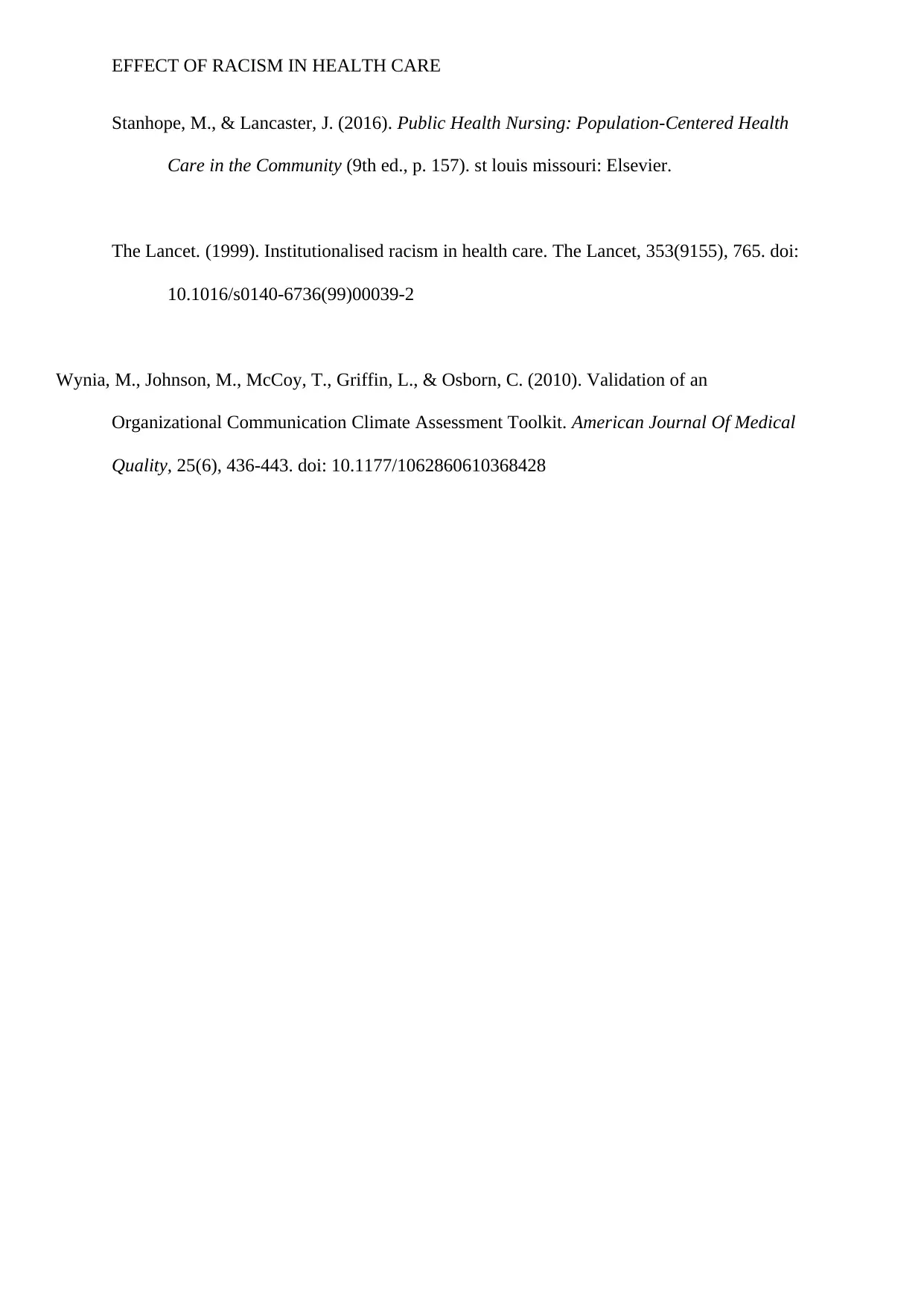
EFFECT OF RACISM IN HEALTH CARE
Stanhope, M., & Lancaster, J. (2016). Public Health Nursing: Population-Centered Health
Care in the Community (9th ed., p. 157). st louis missouri: Elsevier.
The Lancet. (1999). Institutionalised racism in health care. The Lancet, 353(9155), 765. doi:
10.1016/s0140-6736(99)00039-2
Wynia, M., Johnson, M., McCoy, T., Griffin, L., & Osborn, C. (2010). Validation of an
Organizational Communication Climate Assessment Toolkit. American Journal Of Medical
Quality, 25(6), 436-443. doi: 10.1177/1062860610368428
Stanhope, M., & Lancaster, J. (2016). Public Health Nursing: Population-Centered Health
Care in the Community (9th ed., p. 157). st louis missouri: Elsevier.
The Lancet. (1999). Institutionalised racism in health care. The Lancet, 353(9155), 765. doi:
10.1016/s0140-6736(99)00039-2
Wynia, M., Johnson, M., McCoy, T., Griffin, L., & Osborn, C. (2010). Validation of an
Organizational Communication Climate Assessment Toolkit. American Journal Of Medical
Quality, 25(6), 436-443. doi: 10.1177/1062860610368428
1 out of 7
Related Documents
Your All-in-One AI-Powered Toolkit for Academic Success.
+13062052269
info@desklib.com
Available 24*7 on WhatsApp / Email
![[object Object]](/_next/static/media/star-bottom.7253800d.svg)
Unlock your academic potential
Copyright © 2020–2026 A2Z Services. All Rights Reserved. Developed and managed by ZUCOL.




